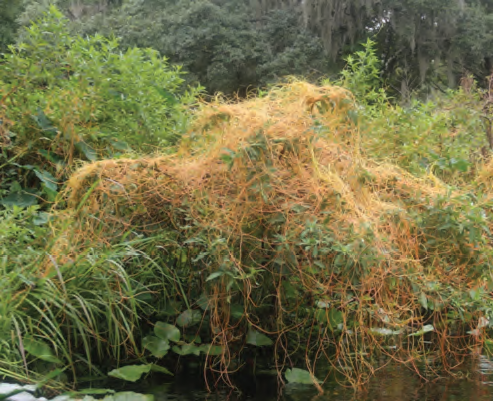Dr. Robert Norman, Clinical Professor, Dermatology, Nova Southeastern University
Photo caption: Love vine along the Hillsborough River.
Photo by Robert Norman.
You are exploring in Florida and you see this yellow-orange plant. What is it? What is its range? Is it native? Is it similar to another plant? How did it get its name?
Love vine (Cassytha filiformis) is a native vine of Florida. It is frequently found in the sandhills, scrubs, and hammocks of the central and southern peninsula (Wunderlin, 2003).
According to the “Wild South Florida” website, Love vine is “one of the plant world’s versions of the vampire bat. It is a parasite that attaches itself to a host plant and sucks the life out of it. Love vine attaches itself to a host plant — usually a live oak — by twining itself around the branches. Love vine also has small appendages called haustoria that burrow into the host, pulling nutrients it can’t produce on its own. Love vine doesn’t necessarily kill its host (that’s self-defeating) but it doesn’t do it any favors, either. It does reduce the host’s vigor and reproductive capacity. If sucking the life out of a plant isn’t enough, love vine’s thick mat reduces the amount of sunlight that hits its host. For some birds and us human types, love vine isn’t so bad.”
Love vine is found in the central part of the state southward, Texas, Hawaii, Puerto Rico and the Virgin Islands, the Caribbean, Mexico, Central America, South America, Africa, Asia, Australia and the Pacific. Love vines have stems that can be 20 feet long, leaves about a millimeter long and flowers, that produce a berry-like fruit called a drupe.
The birds eating the drupe and helping to disperse the seeds and sea currents also contribute to the extensive love vine’s native range. The seeds must be scarified (have their outer shell roughed up a bit) before they germinate, and there is a soil microbe that provides the scarification. Seeds can also last years in the ground and retain their potency to germinate until conditions are right. Given that seedlings don’t have a complete root system, once germinated they must find and attach themselves to a host within a week to survive.
Here is an interesting part of the story. Another plant in Florida is nearly identical to love vine and called tall dodder or tree dodder. Dodder is also a parasite, but it is a member of the morning-glory family. Love vine is a member of Lauraceae, the laurel family.
Given the close resemblance, the love vine is also called laurel dodder. The stems are red and green compared to the yellow-orange of the love vine. When two plants like these, completely botanically unrelated, take separate paths and end up looking so alike and have basically the same survival strategy, it is called convergent evolution.
When looking at the love vine, you might suppose it gets its name from the wide, clingy embrace it gives its hosts. However, it is actually named love vine because the plant is believed to be an aphrodisiac and used for this purpose in certain parts of the world. Love vine is also called Devil’s Gut. Love vine is used In the Gilbert Islands to make jewelry, head wreaths, and clothing and in Hawaii to make garlands and the lei, and in thatch roof construction.
In traditional Hawaiian medicine, love vine was used as a gynecological aid and as a decongestant. The Taiwanese have used love vine to treat gonorrhea and kidney ailments and it has been used in Africa to treat cancer.
http://www.wildsouthflorida.com/love.vine
Get out and explore the Great Florida Outdoors!
Dr. Norman is an advanced master naturalist graduate of the FMNP program from UF and a board-certified dermatologist based in Tampa and Riverview. He can be reached at 813-880-7546.

